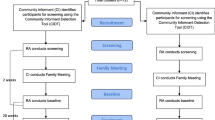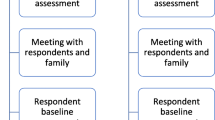Abstract
Purpose
War and conflict have consequences on the mental health of individuals and entire communities and the communities in Aceh, Indonesia, having experienced more than 30 years of armed conflict, are no exception. This study presents results from an evaluation of a non-specific mental health group counseling program among adults affected by conflict. Interventions such as these need to be evaluated to further the limited empirical evidence base for efficacious community-based treatments for improving the mental health and psychosocial problems in humanitarian settings.
Methods
A total of 589 adults were screened using a locally validated measure of mental health and functioning. Of all, 420 (71%) met the study inclusion criteria of elevated symptom levels and functional impairment: 214 and 206 in three intervention and three control villages, respectively. Intervention participants met weekly for eight sessions in groups of eight to ten adults. Following completion of treatment, 175 (85%) controls and 158 (74%) intervention participants were re-assessed. Regression analyses compared pre- and post-intervention scale scores.
Results
We did not find an intervention effect for reducing the burden of depression and anxiety symptoms when compared with the control sample. Impact on functioning was mixed and there was an increase in use of positive coping strategies.
Conclusions
The lack of mental health impact may be because the mental health problems and dysfunction were not due to disorder, but were normal responses to struggles of daily living experienced by this community and not addressed by the intervention.

Similar content being viewed by others
References
Palmieri PA, Canetti-Nisim D, Galea S, Johnson RJ, Hobfoll SE (2008) The psychological impact of the Israel-Hezbollah War on Jews and Arabs in Israel: the impact of risk and resilience factors. Soc Sci Med 67:1208–1216
Priebe S, Bogic M, Ajdukovic D, Franciskovic T, Galeazzi GM, Kucukalic A, Lecic-Tosevski D, Morina N, Popovski M, Wang D, Schutzwohl M (2010) Mental disorders following war in the Balkans: a study in 5 countries. Arch Gen Psychiatry 67:518–528
Steel Z, Chey T, Silove D, Marnane C, Bryant RA, van Ommeren M (2009) Association of torture and other potentially traumatic events with mental health outcomes among populations exposed to mass conflict and displacement: a systematic review and meta-analysis. J Am Med Assoc 302:537–549
Miller KE, Rasmussen A (2010) War exposure, daily stressors, and mental health in conflict and post-conflict settings: bridging the divide between trauma-focused and psychosocial frameworks. Soc Sci Med 70:7–16
Mollica RF, Cardozo BL, Osofsky HJ, Raphael B, Ager A, Salama P (2004) Mental health in complex emergencies. Lancet 364:2058–2067
Mollica RF, Sarajlic N, Chernoff C et al (2001) Longitudinal study of psychiatric symptoms, disability, mortality and emigration among Bosnian refugees. J Am Med Assoc 286:546–554
Nicholl C, Thompson A (2004) The psychological treatment of post traumatic stress disorder (PTSD) in adult refugees: a review of the current state of psychological therapies. J Mental Health 13(4):351–362
Paunovic N, Ost LG (2001) Cognitive-behavior therapy vs. exposure therapy in the treatment of PTSD in refugees. Behav Res Ther 39(10):1183–1197
Kinzie JD, Fleck J (1987) Psychotherapy with severely traumatized refugees. Am J Psychother XLI(1):82–94
Ajdukovic D, Ajdukovic M (2003) Systemic approaches to early interventions in a community affected by organized violence. In: Orner R, Schnyder U (eds) Reconstructing early intervention after trauma. Oxford University Press, New York, pp 82–93
Bolton P, Bass J, Neugebauer R, Clougherty KF, Verdeli H, Wickramaratne P, Ndogoni L, Speelman L, Weissman M (2003) A clinical trial of group interpersonal psychotherapy for depression in rural Uganda. J Am Med Assoc 289:3117–3124
Bolton P, Bass J, Betancourt T, Speelman L, Onyango G, Clougherty K, Neugebauer R, Murray L, Verdeli H (2007) Interventions for depression symptoms among adolescent survivors of war and displacement in Northern Uganda: a randomized controlled trial. J Am Med Assoc 298:519–527
Patel V, Chisholm D, Rabe-Hesketh S, Dias-Saxena F, Andrew G, Mann A (2003) Efficacy and cost-effectiveness of drug and psychological treatments for common mental disorders in general health care in Goa, India: a randomized, controlled trial. Lancet 361:33–39
Inter-Agency Standing Committee (IASC) (2007) IASC guidelines on mental health and psychosocial support in emergency settings. IASC, Geneva
Patel V, Araya R, Chatterjee S, Chisholm D, Cohen A, De Silva M, Hosman C, McGuire H, Rojas G, van Ommeren M (2007) Treatment and prevention of mental disorders in low-income and middle-income countries. Lancet 370:991–1005
Khandelwal S, Avode G, Baingana F, Conde B, Cruz M et al (2010) Mental and neurological health research priorities setting in developing countries. Soc Psychiatry Psychiatr Epidemiol 45:487–495
The Tsunami Global Lessons Learned Project Steering Committee (2009) The tsunami legacy: innovations, breakthroughs and change. http://www.ifrc.org/Docs/pubs/Updates/the-tsunami-legacy.pdf. Accessed 31 May 2010
International Organization for Migration (IOM) (2007) Psychosocial needs assessment of communities in 14-conflict-affected districts in Aceh. http://www.iom.or.id/publications/pdf/17_PNA2eng07-e.pdf. Accessed 25 January 2009
Poudyal B, Bass J, Subyantoro T, Jonathan A, Erni T, Bolton P (2009) Assessment of the psychosocial and mental health needs of the violence-affected populations in Birueuen, Aceh: a qualitative study. Torture 19:218–226
Tol WA, Komproe IH, Susanty D, Jordans MJD, de Jong JTVM (2008) School-based mental health intervention for children affected by political violence in Indonesia: a cluster randomized trial. J Am Med Assoc 300:655–662
Jordans MJD, Komproe IH, Tol WA, Kohrt BA, Luitel NP, Macy RD, de Jong JTVM (2010) Evaluation of a classroom-based psychosocial intervention in conflict-affected Nepal: a cluster randomized controlled trial. J Child Psychol Psychiatry 51(7):818–826
Engels GI, Vermey M (1997) Efficacy of nonmedical treatments of depression in elders: a quantitative analysis. J Clin Geropsychol 3:17–35
Derogatis LR, Lipman RS, Rickels K, Uhlenhuth EH, Covi L (1974) The Hopkins Symptom Checklist (HSCL): a measure of primary symptom dimensions. Mod Probl Pharmacopsychiatr 7:79–110
Schmitz N, Kruse J, Heckrath C, Alberti L, Tress W (1999) Diagnosing mental disorders in primary care: the General Health Questionnaire (GHQ) and the Symptom Checklist (SCL-90R) as screening instruments. Soc Psychiatry Psychiatr Epidemiol 34:360–366
World Health Organization Disability Assessment Schedule II (WHODASII). http://www.who.int/icidh/whodas/
Bolton P, Tang AM (2002) An alternative approach to cross-cultural function assessment. Soc Psychiatry Psychiatr Epidemiol 37:537–543
Bass JK, Ryder RW, Lammers MC, Mukaba TN, Bolton PA (2008) Postpartum depression in Kinshasa, Democratic Republic of Congo: validation of a concept using a mixed-methods cross-cultural approach. Trop Med Int Health 13:1534–1542
Betancourt T, Bass J, Borisova I, Neugebauer R, Speelman L, Onyango G, Bolton P (2009) Measuring local instrument validity and reliability: a field-based example from northern Uganda. Soc Psychiatry Psychiatr Epidemiol 44:685–692
Tol WA, Komproe IH, Jordans MJ, Thapa SB, Sharma B, De Jong JT (2009) Brief multi-disciplinary treatment for torture survivors in Nepal: a naturalistic comparative study. Int J Soc Psychiatry 55:39–56
Rahman A, Malik A, Sikander S, Roberts C, Creed F (2008) Cognitive behaviour therapy-based intervention by community health workers for mothers with depression and their infants in rural Pakistan: a cluster-randomised controlled trial. Lancet 372:902–909
Araya R, Rojas G, Fritsch R, Gaete J, Rojas M, Simon G, Peters TJ (2003) Treating depression in primary care in low-income women in Santiago, Chile: a randomized controlled trial. Lancet 361:995–1000
Mollica RF, Caspi-Yavin Y, Bollini P, Truong T, Tor S, Lavelle J (1992) The Harvard Trauma Questionnaire. Validating a cross-cultural instrument for measuring torture, trauma and posttraumatic stress disorder in Indochinese refugees. J Nerv Mental Disord 180:111–116
Ventevogel P, De Vries G, Scholte WF, Shinwari NR, Nassery HFR, van den Brink W, Olff M (2007) Properties of the Hopkins Symptom Checklist-25 (HSCL-25) and the Self-Reporting Questionnaire (SRQ-20) as screening instruments used in primary care in Afghanistan. Soc Psychiatry Psychiatr Epidemiol 42:328–335
Acknowledgments
We are very grateful to all the Rehabilitation Action for Torture Victims in Aceh (RATA) staff who provided insight into the problems of the local population, implemented the intervention, and informed its ongoing adaptation, as well as those who contributed to the overall logistics which made possible both the intervention and the associated research. We would also particularly like to thank the United States Agency for International Development (USAID) Indonesia, and the USAID Victims of Torture Fund, who provided the necessary institutional and financial support.
Author information
Authors and Affiliations
Corresponding author
Rights and permissions
About this article
Cite this article
Bass, J., Poudyal, B., Tol, W. et al. A controlled trial of problem-solving counseling for war-affected adults in Aceh, Indonesia. Soc Psychiatry Psychiatr Epidemiol 47, 279–291 (2012). https://doi.org/10.1007/s00127-011-0339-y
Received:
Accepted:
Published:
Issue Date:
DOI: https://doi.org/10.1007/s00127-011-0339-y




